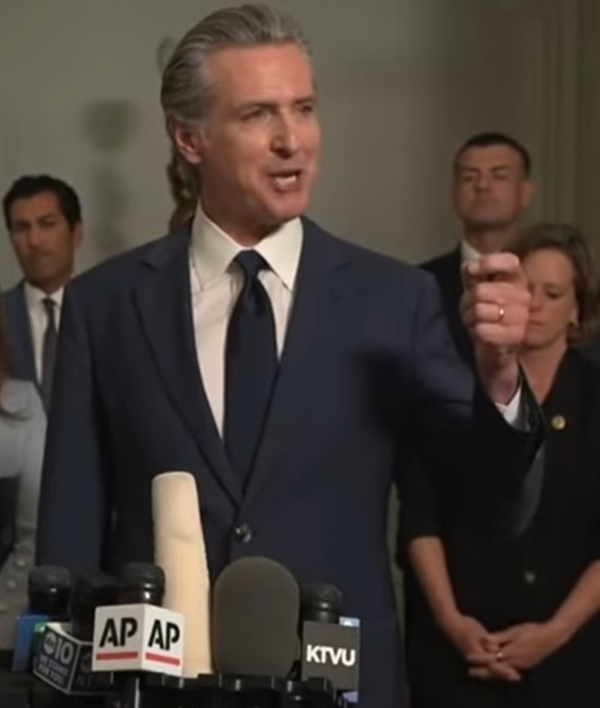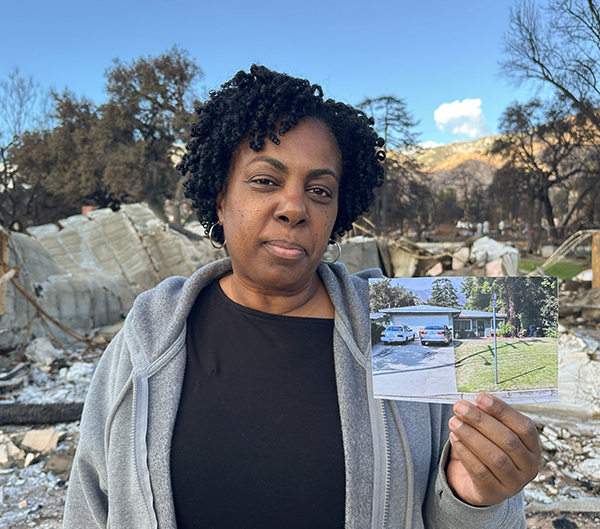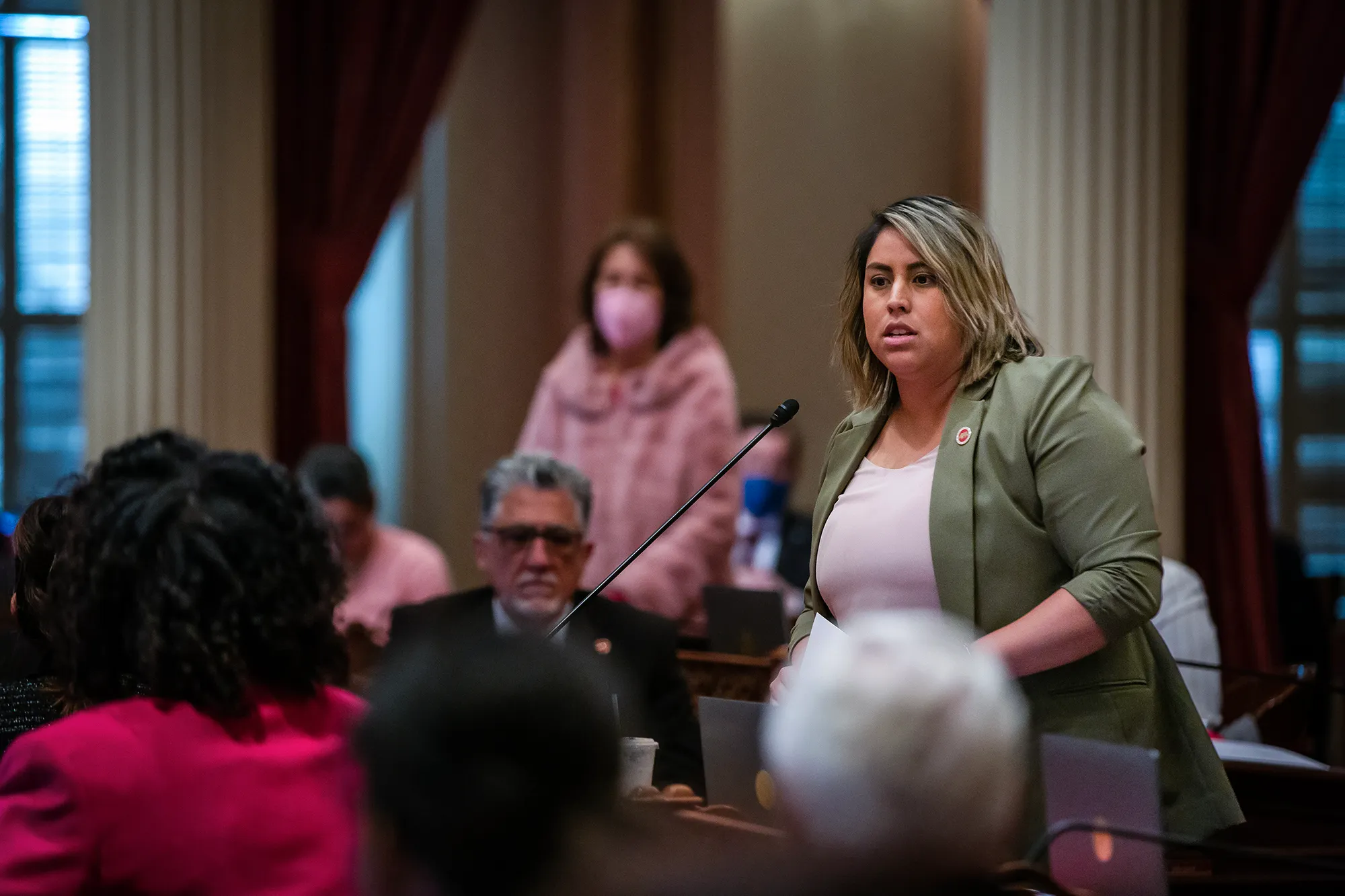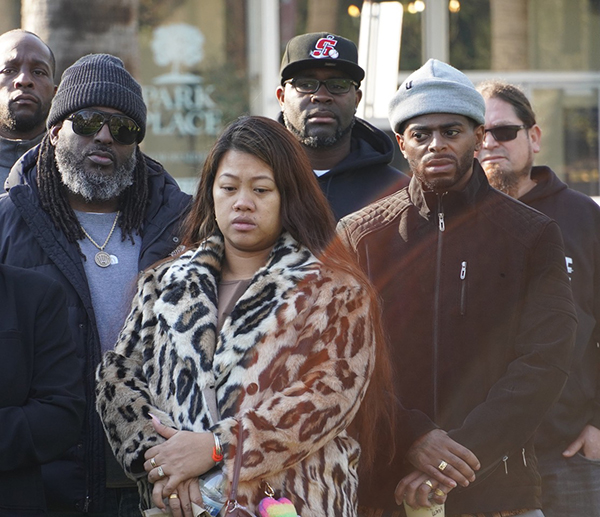Lawmakers make their case for yes vote on Proposition 50

Gov. Gavin Newsom speaks at an August press conference announcing a special election for Proposition 50, the Election Rigging Response Act, Nov. 4. If approved by voters, the measure will allow new congressional district maps to be used in the 2026, 2028 and 2030 elections.
Courtesy photo
By Antonio Ray Harvey
Contributing Writer
SACRAMENTO — Members of the California Congressional Black Caucus, the California Legislative Black Caucus and Gov. Gavin Newsom briefed Black media from across the state Oct. 7, urging support for Proposition 50 — the Election Rigging Response Act — ahead of the Nov. 4 special election.
Editor’s note: This is the second of a two-part series examining Proposition 50 on the Nov. 4 special election ballot. Last week, we featuredthe viewpoints of Proposition 50’s opponents. This week, we offer perspectives from supporters of Proposition 50.
U.S. Reps. Sydney Kamlager-Dove, D-Los Angeles, and Lateefah Simon, D-Oakland, joined Newsom and state Sen. Akilah Weber Pierson, D–San Diego, to present the case that the measure is a targeted, temporary step to safeguard Black and brown voting power.
“We’re talking to the Black press to translate what is at stake here,” said Simon, a San Francisco native. “The Black press, historically, has been the cavalry for civil rights in this country. We hope you will translate what’s at stake to the voters who have the most power in the state.”
Placed on the ballot by Newsom and legislative leaders in August, Proposition 50 would allow the Legislature to adopt temporary congressional district maps for the 2026, 2028 and 2030 elections. After that, authority would return to the state’s independent Citizens Redistricting Commission in 2031. Vote-by-mail ballots are being sent to all active, registered voters, and in-person voting will be available statewide.
Supporters say Proposition 50 counters national efforts they contend have diluted voters of color in other states. Opponents argue it’s a partisan power grab that could reduce Republicans’ nine California House seats to five.
Newsom rejected the “slippery slope” critique:
“Doing nothing guarantees we continue to lose checks and balances,” he said. “This is not a slippery slope — it’s a response to an emergency. … It’s high time Democrats do something meaningful and substantive. That’s what we’re doing.”
Newsom said the measure responds directly to President Donald Trump’s unprecedented phone call to Texas Gov. Greg Abbott directing a mid-decade redistricting plan to secure five additional Republican congressional seats.
“Those maps were literally drawn at Mar-a-Lago,” Newsom said. “Ours were developed transparently, through an open process — and now, for the first time in history, voters themselves get to approve their own congressional maps.”
The governor and Black leaders framed California as the nation’s “firewall” against a coordinated rollback of democracy.
“We’re drawing a line in the sand,” Newsom said. “We did not choose this fight — we were drawn into it by an assault on democracy.”
Kamlager-Dove called Proposition 50 “a moral defense” against voter suppression and misinformation, emphasizing that the change is time-limited. She framed it as pushback against moves in states like Texas, Missouri, Indiana, Ohio and Florida, and criticized actions by the Trump administration that she said have harmed Black communities — citing rollbacks of diversity, equity and inclusion initiatives and threats to programs like the Special Supplemental Nutrition Program for Women, Infants, and Children and the Supplemental Nutrition Assistance Program — adding that federal budget turmoil disproportionately hurts Black households.
“If we win back the House in 2026, Black members will again chair the majority of key committees — restoring subpoena power, oversight and the checks and balances that protect our communities,” Kamlager-Dove said.
She also addressed misinformation that Proposition 50 dismantles California’s independent commission.
“The maps were shared with the Legislature, posted online, and every voter will see them on their ballot,” she said. “You can’t get any more transparent than that. It’s temporary, it’s fair, and it protects representation when it’s most under attack.”
The California Legislative Black Caucus has long prioritized protecting and expanding voting rights. Weber-Pierson said the caucus views Proposition 50 as an extraordinary but necessary step to preserve fair representation until the commission resumes its role.
“This is like a butcher,” she said of efforts in other states to dismantle protections. “It is bloody, it is messy. … We do not have the opportunity to sit out on this one.”
Weber Pierson, a practicing physician, added that the stakes are tangible:
“More than one million Black Californians are enrolled in Medi-Cal, and over 60% of our Black children rely on it,” she said. “When you attack representation, you attack funding for housing, health care and education. This is about whether our families keep access to care and opportunity.”
Simon reminded reporters that attacks on voting rights are not new. “After Reconstruction, Black Americans held more than 2,000 elected offices,” she said. “By 1877, violent backlash wiped out that progress. The Voting Rights Act restored it, and the 2013 Shelby decision gutted it again. What we’re seeing now is history repeating itself.”
She called Prop 50 “a temporary but essential shield” to protect communities of color across the nation. “There’s a very strategic, well-funded campaign to erase Black voters,” Simon said. “Prop 50 says not today, not ever.”
Simon also described the campaign’s growing ground game — calling it the most expansive grassroots effort in a generation.
“You’ll see canvassers at laundromats, barber shops, and churches,” she said. “And the ethnic press — you — are the trusted messengers. You hold the bullhorn.”
Supporters argue Proposition 50 is a temporary, targeted response aimed at protecting the voting strength of communities of color in California’s congressional maps. Critics warn it undermines the independent commission and could shift partisan balance.
Newsom, responding again to those concerns, said, “Doing nothing guarantees that we continue to lose the capacity to have oversight. This is temporary, transparent, and democratic. It’s not a slippery slope — it’s a lifeline.”
With ballots already mailed to every voter, Newsom reminded reporters, “Polls don’t vote — people vote. It’s faith and works. Now it’s about getting people to turn in those ballots and make sure their voices are heard.”
Antonio Ray Harvey is a reporter for California Black Media. Staff members Joe W. Bowers Jr. and Solomon O. Smith also contributed to this report.





